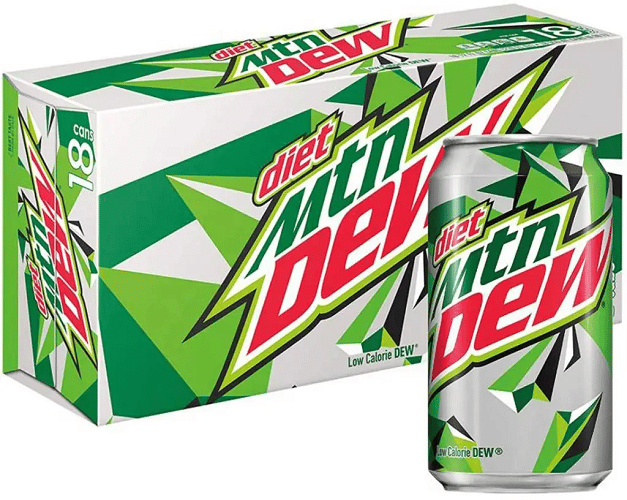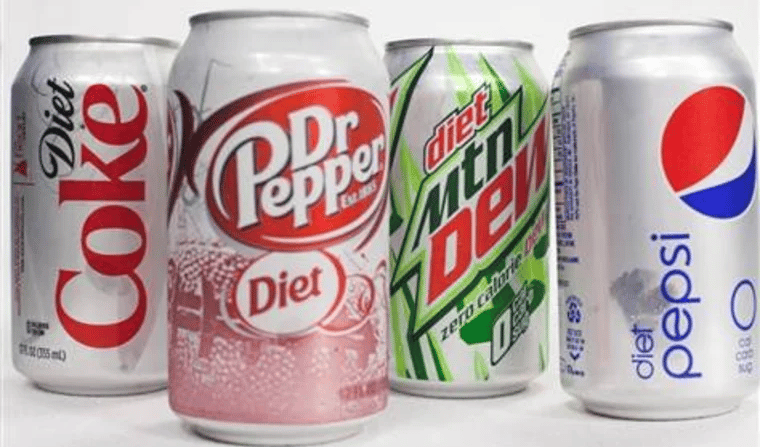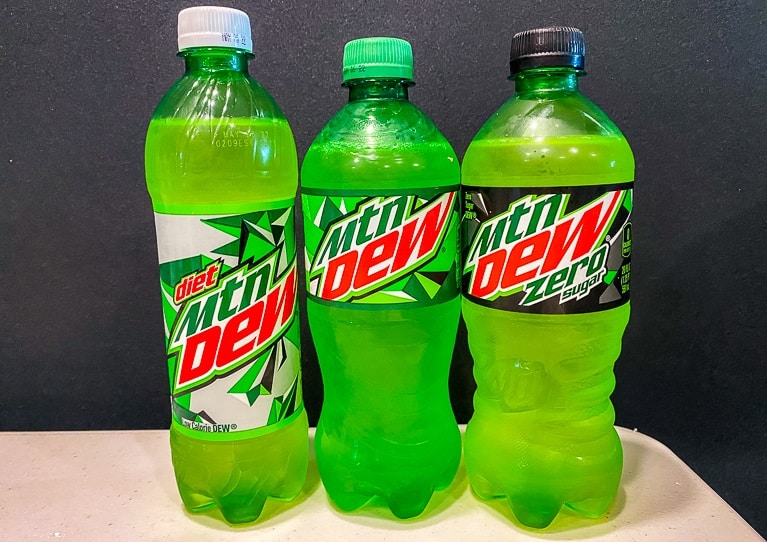Diet Mountain Dew is a popular carbonated soft drink that is marketed as a low-calorie alternative to regular Mountain Dew. It is made by PepsiCo and is a variation of the original Mountain Dew, a citrus-flavored soda with a neon-yellow hue. Like other diet sodas, Diet Mountain Dew is often consumed as a low-calorie alternative to regular soda.
Quick Preview show
When it comes to caffeine, soda, energy drinks, and coffee ranked as the most consumed beverages for the substance. So, does Diet Mountain Dew have caffeine? And if it does, how much caffeine does it have? Typically, Diet Mountain Dew does contain caffeine. In fact, caffeine is one of the main ingredients in soda. Keep reading this article to learn more about Diet Mountain Dew’s caffeine level and how it compares to other beverages.
How much caffeine is in Diet Mountain Dew?

Diet Mountain Dew has caffeine and quite a bit of it for a soda. Typically, Diet Mountain Dew has 4.5 milligrams (mg) of caffeine per ounce. This means that A 12-ounce can of Diet Mountain Dew contains approximately 54 milligrams of caffeine. Here is a summary of the popular serving sizes of Diet Dew and the amount of caffeine they contain.
Serving Size Caffeine (mg) Calories 7.5 fl. oz. 34mg 0 12 fl. oz. 54mg 0 16 fl. oz. 72mg 5 16.9 fl. oz. 77mg 5 20 fl. oz. 91mg 10
How Does the Caffeine Content of Diet Mountain Dew Compare to Other Beverages?

To know whether Diet Mountain Dew has a higher or lower level of caffeine, it’s best to compare its caffeine levels to that of the other drinks. Let’s look at the caffeine content in some common beverages compared to Diet Mountain Dew.
Beverage Serving Size Caffeine (mg) Diet Mountain Dew 12 fl. oz. 54 mg Mello Yello Zero Sugar 12 fl. oz. 51 mg Mountain Zevia 12 fl. oz. 55 mg Faygo Moon Mist 12 fl. oz. 19.7 mg Coca-Cola 12 fl. oz. 34 mg Diet Coke 12 fl. oz. 46 mg Diet Dr. Pepper 12 fl. oz. 41 mg Pepsi One 12 fl. oz. 55.5mg Red Bull 12 fl. oz. 114 mg Monster Energy 12 fl. oz. 120 mg Coffee (Brewed) 12 fl. oz. 136mg
Typically, the amount of caffeine in Diet Mountain Dew is higher than in a soda. However, it’s much lower than the amount of caffeine in most energy drinks or coffee beverages.
Diet Mountain Dew Vs. Mountain Dew

Diet Mountain Dew and Mountain Dew are two different versions of the same soda, with a few key differences in their ingredients and nutritional values.
One of the main differences between the two drinks is their sugar content. Mountain Dew is made with high fructose corn syrup, a type of sugar, while Diet Mountain Dew is sweetened with artificial sweeteners and has no sugar content.
However, when it comes to the caffeine level, Diet Mountain Dew and regular Mountain Dew have the same amount of caffeine.
Overall, the choice between Diet Mountain Dew and regular Mountain Dew comes down to personal preference and dietary needs. There is not much difference in consuming one over the other.
Coffee Vs. Diet Mountain Dew: Which has More Caffeine?
Coffee and Diet Mountain Dew both contain caffeine, but coffee generally contains more caffeine than Diet Mountain Dew.
The caffeine content of coffee can vary depending on the type of coffee, how it’s brewed, and how much you drink. On average, an 8-ounce cup of brewed coffee contains around 95 milligrams of caffeine, while a 12-ounce cup of drip coffee can contain anywhere from 140 to 200 milligrams of caffeine.
In comparison, a 12-ounce can of Diet Mountain Dew contains around 54 milligrams of caffeine which is about half the amount of caffeine found in a typical 8-ounce cup of coffee. Generally, the amount of caffeine in Diet Mountain Dew is lower than what you’d get from a cup of coffee. Therefore, if you’re looking for a stronger caffeine kick, coffee is likely to have more caffeine than Diet Mountain Dew.
Ingredients of The Diet Mountain Dew

Diet Mountain Dew is a carbonated citrus-flavored soda that is sweetened with artificial sweeteners, primarily aspartame and acesulfame potassium, rather than sugar. Therefore, Diet Mountain Dew has very few calories. Caffeine is also an ingredient that is added to this soda. Here are the different ingredients of Diet Mountain Dew:
Carbonated Water, Concentrated Orange Juice, Citric Acid, Natural Flavor, Citrus Pectin, Potassium Benzoate (Preserves Freshness), Aspartame, Potassium Citrate, Caffeine, Sodium Citrate, Acesulfame Potassium, Sucralose, Gum Arabic, Sodium Benzoate (Preserves Freshness), Calcium Disodium EDTA (to Protect Flavor), Brominated Vegetable Oil, Yellow 5.
It also contains a small amount of concentrated orange juice and natural flavorings to give it its characteristic citrus taste.
Can Caffeine Become Addictive?
Caffeine is a stimulant that can help to increase mental alertness and reduce fatigue. However, regular intake of caffeine may lead to addiction. Additionally, it can also cause negative side effects, such as jitters, anxiety, and insomnia, especially when consumed in large amounts or by individuals who are sensitive to caffeine.
Therefore, if you are concerned about your caffeine intake, it’s important to be mindful of how much Diet Mountain Dew and other caffeinated beverages you consume each day and to limit your intake if necessary.
Does Diet Mountain Dew Have Sugar?
No, Diet Mountain Dew does not contain sugar. Instead, it’s sweetened with acesulfame potassium, aspartame, and sucralose, which are low-calorie sugar substitutes. These artificial sweeteners are alternatives to the high fructose corn syrup found in regular sodas such as Coke.
Consuming too much sugar can contribute to weight gain, tooth decay, and various other health problems. For this reason, Diet Mountain Dew is a healthier alternative to regular soda with high sugar content.
Conclusion
Generally, Diet Mountain Dew has caffeine, such that a 12-ounce can of Diet Mountain Dew has 54 milligrams of caffeine. While that may be the case, many people choose to consume low-sugar or sugar-free beverages like Diet Mountain Dew as an alternative to regular soda. However, it’s also worth noting that different people have different tolerances to caffeine. Some may be more sensitive to its effects than others. For this reason, it’s important to be mindful of your caffeine intake and to consume it in moderation, especially if you are sensitive to its effects or have any underlying health conditions.